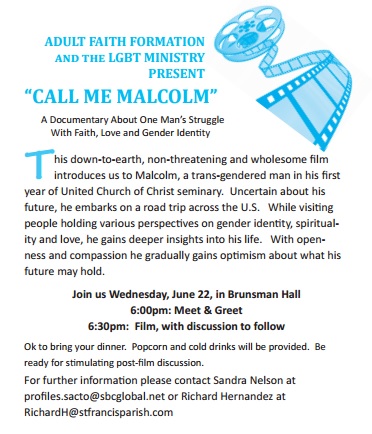
The documentary film “Call Me Malcolm,” about a young woman, who is transitioning to a transman while studying to be a minister with the United Church of Christ, will be shown at Saint Francis of Assisi Catholic Church in Sacramento, California on June 22, 2016. Throughout the film, “Malcolm” meets and talks with various friends, family members, and other transgender and transsexual people – all of whom support her decision to transition to a male. Although she briefly mentions her strained relationship with her parents, we never meet them, but her brother, who is “gay,” does appear in the film. We do learn that in her youth – Malcolm was suicidal.
Some of the more candid and explicit conversations take place between “Malcom” and members of a female to male support group. One member is a woman who transitioned to a transman who is now living as a “gay” man. Later, Malcom interviews a former lesbian who fully transitioned from female to male; in this conversation, they discuss the feasibility of penile implants. Malcolm also talked about her own bilateral mastectomy.
During another conversation, Malcolm talks with one of her former high-school teachers. When discussing the negative reaction of Malcolm’s father and mother, the teacher tried to empathize with the parents and their memories of Malcolm as a baby girl; Malcolm responded, referring to the notion of herself as a once female child: “But it’s not a woman, it’s not anything yet.”
Traveling to California, Malcolm talks with former drag performer Calpurnia Addams. Addams does not believe in any form of organized religion; he says to Malcolm: “…you have to find your own truth.”
Some quotes from the film:
Pastor Emily: “I think God was very clear in Genesis. When we hear the language, in the image of God was humanity created both male and female; and you’ve heard me articulate before that my theology of transgender is that: if you are looking for someone who incarnates the most clear and whole vision of who God is, based on our Scripture tradition, that it has to be a transgender person who experienced both male and female. That is the most whole vision of the sacred that we are going to get.”
Dr. Tinker: “The bottom line is…people had different experiences, different inclinations, different orientations and made a place in society for everybody so the cultures deal with gay and lesbian stuff in very different ways; and the repressiveness of the Euro-Western Christian society isn’t necessarily the norm.”
Malcolm: “We’re always trying to get this fit, not only with our bodies, but with our context. And when we have that – it’s a treasure, when we don’t have that – it’s a torture.”
Malcolm: “So I had a female body, and so when I turned 12 or something like that, the female body kicked me into female puberty which mostly involves secondary sex characteristics like breasts and hips; and that also involves menstruation and I didn’t appreciate that very much…F-to-Ms [female to male transgender persons] talk about binding and we try various things to wrap our chest really tight so it doesn’t look like we have breasts and I had small breasts so I was doing that from the time I was 13 without really being aware of what I was doing. But I always tried to make it look like I really didn’t have breasts…”
Malcolm: “People think that even anatomically, hormonally, and physiologically that there is a clear cut distinction between what is a male and what is a female, but nobody is really sure how we define those.”
Author’s note: In this age of confusion, madness, and senseless violence, the Catholic Church should always be a refuge of clarity, honesty, and peace. Only, in some places, the Church simply echoes the reverberations of a culture that, on certain issues, often emits a singular voice. Consequently, “Call Me Malcolm” is a highly flawed film, as no alternatives, no contradictory opinions, and no dissenting voices are ever presented.
There is unity in official Catholic teachings on the subjects of homosexuality and transgenderism, but “pastoral” practices are wildly varied; this situation does not facilitate calm or understanding, but restlessness and uncertainty.
“The Lord Jesus promised, ‘You shall know the truth and the truth shall set you free’ (Jn. 8:32). Scripture bids us speak the truth in love (cf. Eph. 4:15). The God who is at once truth and love calls the Church to minister to every man, woman and child with the pastoral solicitude of our compassionate Lord.” – Letter to the Bishops of the Catholic Church on the Pastoral Care of Homosexual Persons

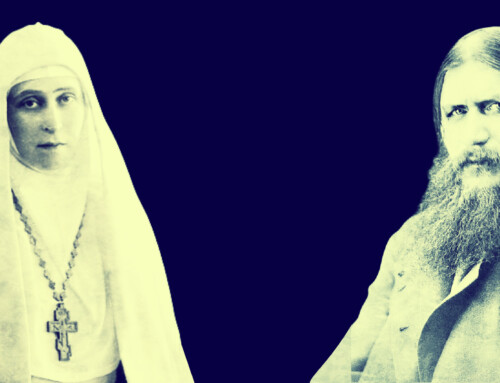
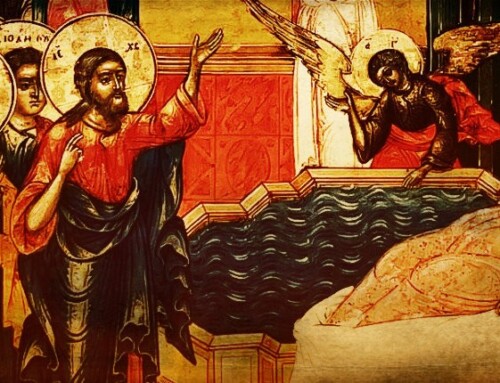
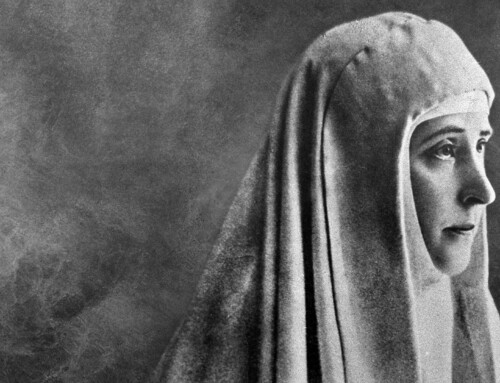
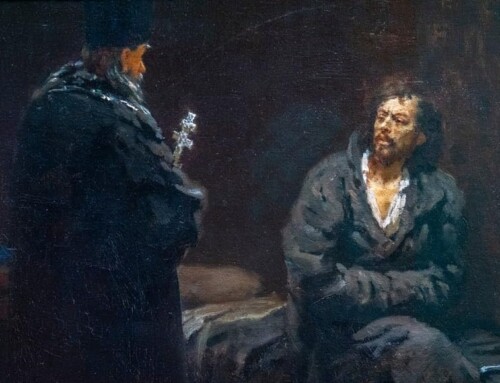
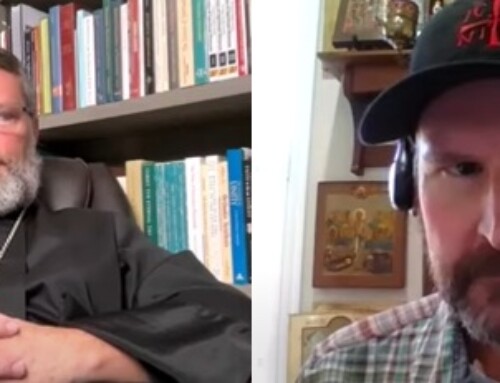
It is very sad that the Catholic Church which has been a bastion of truth is now succumbing to the lgbtq culture.
It is long overdue for P. Francis to speak out clearly on the dogma re homosexuality, and give clear direction re pastoral measures to this hurting community -they deserve to know the truth in love, not a reinforcing of a deathly culture.
Also can you explain the present status of the Courage Apostolate after PF’s post synodal Apostolic Exhortation which has raised many concerns in the faithful Catholic community.
Thanks Joseph for your untiring work and valuable work in this regard. Nobody can understand or explain the myths and truth surrounding homosexual behavior, like yourself, who has experienced first hand the pain and deception that you have gone through.
I have shared your website with many in the hope that God will use you to help others.
Praying for your continued perseverance in this important ministry.
Maria,
Respectfully, the Catholic Church has NOT changed and is still THE bastion of truth. The only bastion of truth I might add. There are however people in the Church who would love to change it to current trends and have been trying for roughly 2000 years. It will not and can not be changed. It is not man made. We have rogue bishops and priests throughout the church who need our prayers because after all, they are human – sinners.
Joseph, heard your story on Catholic Answers Focus – very edifying. Like my Pastor says, “Stay in the struggle”!
Greg
‘ Consequently, “Call Me Malcolm” is a highly flawed film, as no alternatives, no contradictory opinions, and no dissenting voices are ever presented.’
What you describe is known as Values Clarification. It has been devastating to the Church. Joseph, if you’re interested in one of the origins of the crisis in the American Catholic Church, I recommend reading about Dr. William Coulson’s role and that of his colleague Carl Rogers. It will all make sense as it has to me.
THE ROAD TO MALPSYCHIA: HUMANISTIC PSYCHOLOGY AND OUR DISCONTENTS
JOYCE MILTON. 2002. ENCOUNTER BOOKS
His explanation on tape set: Psychology in Education: friend or foe? https://www.marianland.com/stjosephcom2/psychologyineducation1.html
An interview with Dr. Coulson, “WE OVERCAME THEIR TRADITIONS, WE OVERCAME THEIR FAITH”
https://www.ewtn.com/library/PRIESTS/COULSON.TXT
God bless.